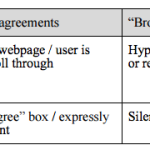
“Modified Clickwrap” Upheld In Court–Moule v. UPS
[Eric’s introduction: today Venkat and I are “celebrating” (?) TOS Arbitration Day here at the Technology & Marketing Law Blog. Independently, we each drafted blog posts about arbitration clauses in terms of service–covering different cases! We could have combined the…
Supreme Court Revisits Copyright’s Attorney Fee Shifts–Kirtsaeng v. Wiley
The Copyright Act, 17 U.S.C. 505, has a discretionary “loser-pays” attorneys’ fee shift. We’ve blogged repeatedly about abusive copyright enforcements where that fee shift provides a modicum of fairness to defendants (e.g., Inglewood v. Teixeira; Katz v. Chevaldina; Righthaven v….
Second Circuit Muddies The Trademark Nominative Use Doctrine–ISC2 v. Security University
The nominative use doctrine allows third party references to trademark owners using the trademarks they chose as their preferred descriptors. Without a robust and well-functioning nominative use doctrine, trademark owners can have too much control over their brands–they can shut…
Talk on Section 230 and Consumer Reviews
In April, I gave a talk at the University of Sussex on Section 230 as economy policy by encouraging consumer reviews that improve marketplaces. If this sounds vaguely familiar, you’re not imagining things. I’ve been working on this paper since…
Is Uber Liable When Drivers Sexually Abuse Passengers? (Forbes Cross-Post)
Uber allegedly has over 300,000 drivers. In a population that large, inevitably some bad apples will do stupid or illegal things. Uber tries to curb such behavior by doing background investigations (which it has also been sued for) and removing…

FTC Wins Deception Case Over Faux User-Generated Content–Fanning v. FTC
John Fanning challenged the FTC findings that the website he developed, named Jerk.com, materially misrepresented its attributes. On appeal, the First Circuit affirms. Jerk.com resembled Ripoff Report, but for people. The court’s description of the site and its offerings are…
The Pros and (Scary) Cons of the New EU Trade Secret Directive, Part 2 (Guest Blog Post)
By Guest Blogger Sharon K. Sandeen Part One of this post gave an overview of the new EU Trade Secret Directive (the “TS Directive”) that will be effective shortly (on the twentieth day after it is published in the Official…

Facebook Gets Bad Ruling In Face-Scanning Privacy Case–In re Facebook Biometric Information Privacy Litigation
The plaintiffs allege Facebook’s face-scanning functionality (that underlies its “tag suggestion” feature) violates the Illinois Biometric Information Privacy Act. Several lawsuits were originally filed in Illinois, but the parties agreed to transfer the cases to the Northern District of California,…

Q1 2016 Quick Links, Part 4 (Copyright, Marketing and More)
Copyright * Naruto v. Slater: “Naruto is not an “author” within the meaning of the Copyright Act.” I heart Naruto! * Handshoe v. Abel, 1:14-cv-00159-KS-MTP (S.D. Miss. Jan. 8, 2016) (cites omitted): Given that there is no dispute that the…

Evidentiary Failings Undermine Arbitration Clauses in Online Terms
Earlier this week, we posted about a Seventh Circuit case where an ambiguous user call-to-action undermined an online contract formation procecss. (See “Defective Call-to-Action Dooms Online Contract Formation–Sgouros v. TransUnion“.) Recently, a couple of trial courts issued rulings denying companies’…
